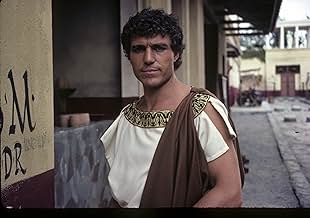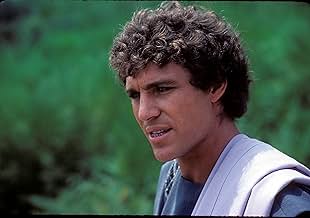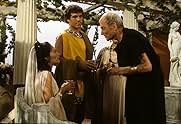Ajouter une intrigue dans votre langueRich residents of Pompeii enjoy luxury life until Vesuvius erupts, burying the city. inhis daughter Julia, cultured Greek Glaucus, gladiator Lydon, nobles Antonius and Ione, villainous pries... Tout lireRich residents of Pompeii enjoy luxury life until Vesuvius erupts, burying the city. inhis daughter Julia, cultured Greek Glaucus, gladiator Lydon, nobles Antonius and Ione, villainous priest Arbaces, and persecuted Christian slaves.Rich residents of Pompeii enjoy luxury life until Vesuvius erupts, burying the city. inhis daughter Julia, cultured Greek Glaucus, gladiator Lydon, nobles Antonius and Ione, villainous priest Arbaces, and persecuted Christian slaves.
Parcourir les épisodes
Avis en vedette
I wish that Carmen Culver & Edward Bulwar Lyon lived in the same era & that Carmen Culver read over his writings at the time, & had rewritten it for him, so that her work would be the actual "The Last Days of Pompeii" novel.
The truth is, the original was horrible. Edward Bulwar's writing of the book was very cheesy.
I will never understand why the critics panned her work. Her miniseries was really wonderful. After seeing it again after so many years, I still absolutely loved it.
A 100% romantic movie.
The truth is, the original was horrible. Edward Bulwar's writing of the book was very cheesy.
I will never understand why the critics panned her work. Her miniseries was really wonderful. After seeing it again after so many years, I still absolutely loved it.
A 100% romantic movie.
79 A.D. 52 years into Pax Romana and 46 years after the death of Christ, Decadent Pompeiians make life uncomfortable for Christians when they aren't outright killing them. Wealthy citizens struggle to relate to their slaves whilst social climbing. Slaves, as depicted here generally appear more concerned with self-esteem issues than how back-breaking their labour is and the volcano behind them is set to blow any minute.
A decadent coast city with flaky rich people, wide-scale prostitution, and a dangerous cult all co-existing while the ground shakes? It is like modern Los Angeles only without the hard drugs or racial tensions.
The easiest criticism to make about this mini-series is that it tries to tell too many stories at once and tells none of them properly with an ending alluded to not merely by history but the title. A grab bag of subplots on offer have a few intriguing elements amidst the mostly boring ones but added together they make for an incoherent muddled mess interlocking too neatly at the end.
There are a lot of examples of clunky historical epic expositional dialogue beyond the narrator at the beginning which turns into heavy-handed metaphysical discussion the viewer might not be ready for.
Whatever potential appeal this mini-series might have had appears to have heavily been placed upon a location shoot and legacy casting of actors who had triumphed in roles set in the ancient world.
Olivia Hussey and Ernest Borgnine had both been in Jesus of Nazareth (1977) along with Lord Laurence Olivier who had of course also appeared in Spartacus (1960). Anthony Quayle had been in Masada (1981) and The Fall of the Roman Empire (1964). Brian Blessed and David Robb had been in I,Claudius (1976). Brian Coburn was in Julius Caesar (1979) and The Day Christ Died (1980). Howard Goorney was in Antony & Cleopatra (1981) and Peter & Paul (1981). Stephen Grief was in The Cleopatras (1983). Nicholas Clay played the title role in The Search For Alexander the Great (1981). Howard Lang had been in Ben-Hur (1959). Marilu Tolo is credited as having been in several gladiator movies in the 1960s.
As for the much celebrated homoerotic undertones, I cannot really say I know what those might be but my guess would be they has to do with Lydon - the gladiator played by Canadian actor Duncan Regehr. Different people look for different things I reckon and because of it they might see things which are not there.
A decadent coast city with flaky rich people, wide-scale prostitution, and a dangerous cult all co-existing while the ground shakes? It is like modern Los Angeles only without the hard drugs or racial tensions.
The easiest criticism to make about this mini-series is that it tries to tell too many stories at once and tells none of them properly with an ending alluded to not merely by history but the title. A grab bag of subplots on offer have a few intriguing elements amidst the mostly boring ones but added together they make for an incoherent muddled mess interlocking too neatly at the end.
There are a lot of examples of clunky historical epic expositional dialogue beyond the narrator at the beginning which turns into heavy-handed metaphysical discussion the viewer might not be ready for.
Whatever potential appeal this mini-series might have had appears to have heavily been placed upon a location shoot and legacy casting of actors who had triumphed in roles set in the ancient world.
Olivia Hussey and Ernest Borgnine had both been in Jesus of Nazareth (1977) along with Lord Laurence Olivier who had of course also appeared in Spartacus (1960). Anthony Quayle had been in Masada (1981) and The Fall of the Roman Empire (1964). Brian Blessed and David Robb had been in I,Claudius (1976). Brian Coburn was in Julius Caesar (1979) and The Day Christ Died (1980). Howard Goorney was in Antony & Cleopatra (1981) and Peter & Paul (1981). Stephen Grief was in The Cleopatras (1983). Nicholas Clay played the title role in The Search For Alexander the Great (1981). Howard Lang had been in Ben-Hur (1959). Marilu Tolo is credited as having been in several gladiator movies in the 1960s.
As for the much celebrated homoerotic undertones, I cannot really say I know what those might be but my guess would be they has to do with Lydon - the gladiator played by Canadian actor Duncan Regehr. Different people look for different things I reckon and because of it they might see things which are not there.
10s-cools
I've read the novel written by Bulwer Lytton, I visited Pompeii about 5 times and have read scores of books on the city and its dramatic destruction. This is the best screen adaptation of the book so far. It sticks quite well to Bulwer's novel and adds quite a few pleasant characters and events. Of course this mini-series is not perfect, even has countless flaws : the Temple of Isis, the houses of Glaucus and Diomedes come directly out of the set-designers' imagination, sending Christians to the lions is a bit too cliché, some aspects of the novel have been changed to make it all more dynamic (the novel is very slow-paced actually). But all in all, the plot is interesting, changes and additions good. Nead Beatty's portrayal of Diomedes is just brilliant!! Lesley-Ann Down is gorgeous as Chloe... The day this mini-series comes out on DVD, I'll buy it right away!
This is definitely more than an antique soap opera. It's without a doubt the most beautiful interpretation of the novel. May be that the story is geared to the 80's generation, but the pictures it shows are unforgettable!
A magnificent set-decoration and the most authentic art-direction I've ever seen (look at the temple of Isis: even the number of stairs tallies with the original!), tasteful, opulent costumes and finally a few amazing visual-effects, phenomenal for a TV-mini.
Trevor Jones' music is another wonder. As a great fan of soundtracks I always listen more to the scores than to the dialogues, when I watch a film. Mr. Jones is a man of genius; able to give the worst movies ("G.I. Jane", "The mighty"..) grace and poesy through his music.
I never heard a more haunting, majestic music than his score for "The last days of Pompeii" and I get a goose-flesh whenever I hear the main-theme - still after twelve years.
The cast is marvelous, as well. Sir Laurence Olivier, Franco Nero, Olivia Hussey and two outstanding No-names: Lesley-Anne Down and Linda Purl. Both of them are beautiful AND talented, although they rarely were able to show what they are made of.
I traveled to Pompeii a few times, considering the magic of this forgotten masterpiece. What can I say... the most beautiful town of the earth! And this motion picture is its impressive monument. Thanks.
A magnificent set-decoration and the most authentic art-direction I've ever seen (look at the temple of Isis: even the number of stairs tallies with the original!), tasteful, opulent costumes and finally a few amazing visual-effects, phenomenal for a TV-mini.
Trevor Jones' music is another wonder. As a great fan of soundtracks I always listen more to the scores than to the dialogues, when I watch a film. Mr. Jones is a man of genius; able to give the worst movies ("G.I. Jane", "The mighty"..) grace and poesy through his music.
I never heard a more haunting, majestic music than his score for "The last days of Pompeii" and I get a goose-flesh whenever I hear the main-theme - still after twelve years.
The cast is marvelous, as well. Sir Laurence Olivier, Franco Nero, Olivia Hussey and two outstanding No-names: Lesley-Anne Down and Linda Purl. Both of them are beautiful AND talented, although they rarely were able to show what they are made of.
I traveled to Pompeii a few times, considering the magic of this forgotten masterpiece. What can I say... the most beautiful town of the earth! And this motion picture is its impressive monument. Thanks.
I love this film! I have been looking for it for the past 5 years. I grew up watching this film over and over. In fact, for a brief history:
my parents recorded this film off the T.V station it played on (I can't remember which, though I've looked for it at the three major ones) and when we moved to Nigeria, I watched it for the first time. This was years after they had recorded it of course. I watched it often, since it's long and it took three tapes for the entire film, it was my favorite chore (self-imposed of course) to watch it and make sure the tape was not ruined. You can imagine how many times I took it upon myself to ensure this.
Basically, the last time I watched it was in 1998! And when I was coming back here that year, I did not have enough space in my suitcase to bring all the books and films I wanted to. So sadly, it got left behind.
I am a film student today, and I want to see if the film still holds up to the ideals it did when I was 17. It is definitely a must watch! If you like epic movies like "The Ten Commandments" and "Ben Hur" you will love this film. The history of the people, the effects of the explosion (which I must confess were a bit repetitious and made me think of foam buildings sometimes), the characters, the world the characters inhabited...WOW! I could go on...Films like this one (well, this film really) made me yearn to learn the Roman culture so much that I actually made it a goal (which I have met, and hopefully will again) to visit Rome and see the Colosseum. Gladiator, eat your heart out! This film showed the culture of the people and their lifestyles, not just blood and gore.Watch it if you can. I wish it were released in theaters--if they ran films that long.
my parents recorded this film off the T.V station it played on (I can't remember which, though I've looked for it at the three major ones) and when we moved to Nigeria, I watched it for the first time. This was years after they had recorded it of course. I watched it often, since it's long and it took three tapes for the entire film, it was my favorite chore (self-imposed of course) to watch it and make sure the tape was not ruined. You can imagine how many times I took it upon myself to ensure this.
Basically, the last time I watched it was in 1998! And when I was coming back here that year, I did not have enough space in my suitcase to bring all the books and films I wanted to. So sadly, it got left behind.
I am a film student today, and I want to see if the film still holds up to the ideals it did when I was 17. It is definitely a must watch! If you like epic movies like "The Ten Commandments" and "Ben Hur" you will love this film. The history of the people, the effects of the explosion (which I must confess were a bit repetitious and made me think of foam buildings sometimes), the characters, the world the characters inhabited...WOW! I could go on...Films like this one (well, this film really) made me yearn to learn the Roman culture so much that I actually made it a goal (which I have met, and hopefully will again) to visit Rome and see the Colosseum. Gladiator, eat your heart out! This film showed the culture of the people and their lifestyles, not just blood and gore.Watch it if you can. I wish it were released in theaters--if they ran films that long.
Le saviez-vous
- AnecdotesCarmen Culver's television script added so many new characters, and changed so many sequences from the 1834 novel by Edward George Bulwer-Lytton that her version merited a paperback novelization of its own, written by David Wind.
- ConnexionsReferenced in Minty Comedic Arts: 10 Things You Didn't Know About V (2024)
Meilleurs choix
Connectez-vous pour évaluer et surveiller les recommandations personnalisées
- How many seasons does The Last Days of Pompeii have?Propulsé par Alexa
Détails
- Date de sortie
- Pays d’origine
- Langue
- Aussi connu sous le nom de
- Los últimos días de Pompeya
- Lieux de tournage
- sociétés de production
- Consultez plus de crédits d'entreprise sur IMDbPro
Contribuer à cette page
Suggérer une modification ou ajouter du contenu manquant





































